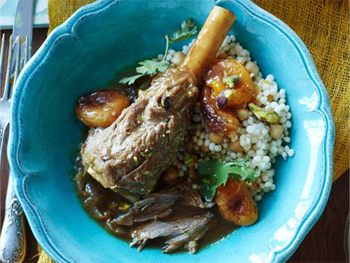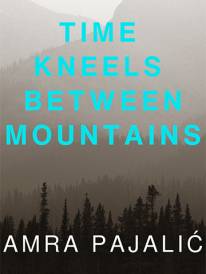Moroccan Lamb Shanks

Moroccan Lamb Shanks with Apricots and Pistachios
A juicy and simple dish that is full of flavour and texture.
Preparation: 25 minutes
Cooking: 2 hours 30 minutes
Serves: 4
Ingredients
4 320g lamb shanks, frenched
1/4 cup plain flour
1/4 cup olive oil
2 small red onions, thinly sliced
3 cloves garlic, thinly sliced
2 tsp ground ginger
1 cinnamon quill
2 cups good quality beef stock
1/4 cup tamarind puree
2/3 cups dried apricots
1/2 cup pistachios, roasted
1/4 cup roughly chopped coriander
Pearl couscous and chickpea salad, to serve
Method
Place lamb shanks and flour in a large bowl and toss to coat, then season with salt and pepper.
Heat oil in a large ovenproof casserole dish or tagine over medium-high heat. Dust excess flour from lamb shanks and fry for 5 minutes, turning, or until lightly browned all over. Remove shanks from the dish and set aside. Pour off most of the fat and oil from the dish, leaving about 2 tablespoons.
Preheat oven to 160°C. Return dish to the heat and add onions and garlic. Cook, stirring occasionally, for 5 minutes until onions are soft. Add ginger and cinnamon and cook for a further 3 minutes or until fragrant.
Add stock, tamarind and apricots and stir to combine. Place shanks back into the dish, push down slightly and turn to coat in liquid. Bring to a gentle simmer, then cover. Bake for 2 1/2 hours or until lamb falls away from the bone.
To serve, divide shanks among four plates, spoon over sauce and sprinkle with pistachios and coriander. Serve with pearl couscous and chickpea salad.
Slow-cooked Lamb Shanks made Deliciously Simple
Six surprisingly different ways to cook with lamb shanks this winter
Cooked until they're fall-apart tender, lamb shanks make a delicious and satisfying meal. They are quick and easy to prepare, with the oven, stovetop or slow cooker releasing their mouth-watering succulence and flavour.
No matter the recipe, lamb shanks are at their best when browned in a pan then finished off low and slow in cooking liquid. Great for a get together or as easy midweek dinner, simply put the lamb shanks in a slow cooker in the morning before heading out for the day for an irresistible dinner awaiting you after work.
Lamb shank handy cooking tips:
Don't rush the initial stage of browning the lamb. This will result in a meal rich in colour and flavour.
Make use of the rich flavours left from browning the lamb. After removing the lamb, scrape up the browned bits from the bottom of the pan and add them to your dish to make good use of all the flavour.
It's easy to use the stovetop rather than an oven. Use a heavy-based pan or dish, stir the meal often and adjust the temperature if needed to avoid the mixture sticking to the bottom and burning.
Maintain a gentle simmer. Controlling the heat is important; too low a heat will affect flavour, too high a heat and the meal will boil, resulting in tough, dry lamb.
Converting a recipe for the slow cooker. As a general guide, you can convert any oven or stovetop recipe by allowing 5-6 hours on low or 2-2.5 hours on high in a slow cooker for every hour in the original recipe. Since there is little evaporation when cooking with a slow cooker, reduce the liquid the recipe calls for by about a cup. The lamb will fall off the bone when tender and ready.
For additional recipe inspiration, visit www.australianlamb.com.au
MORE



